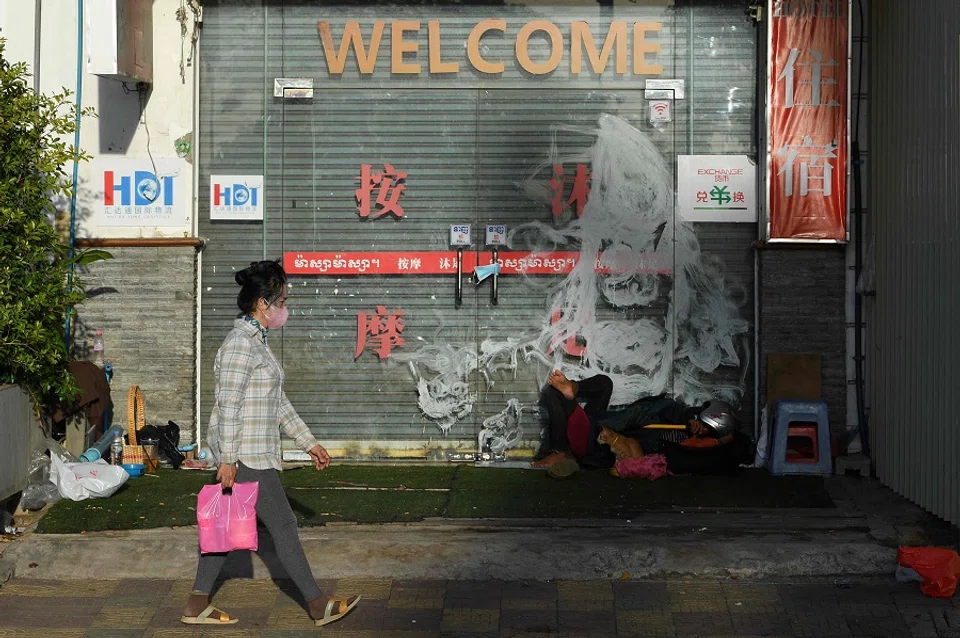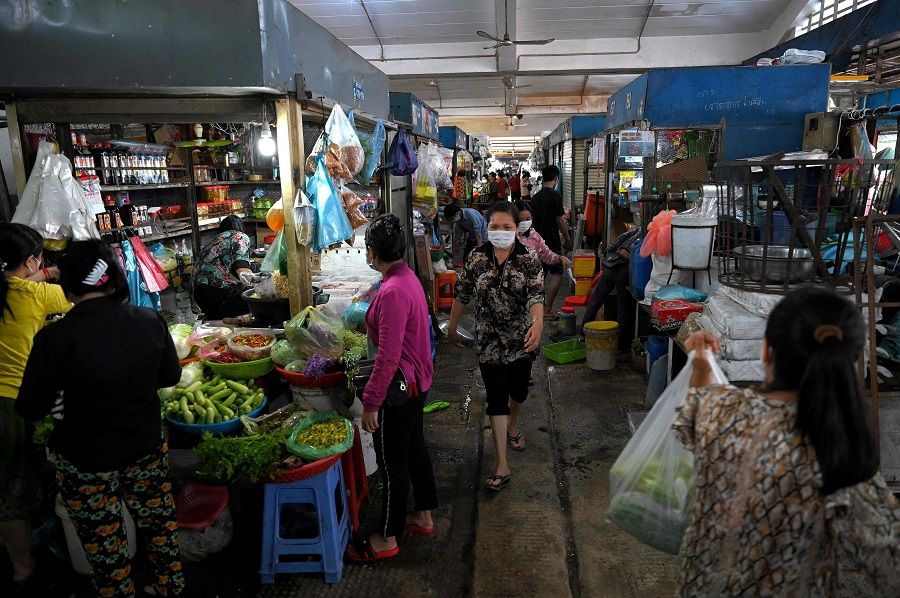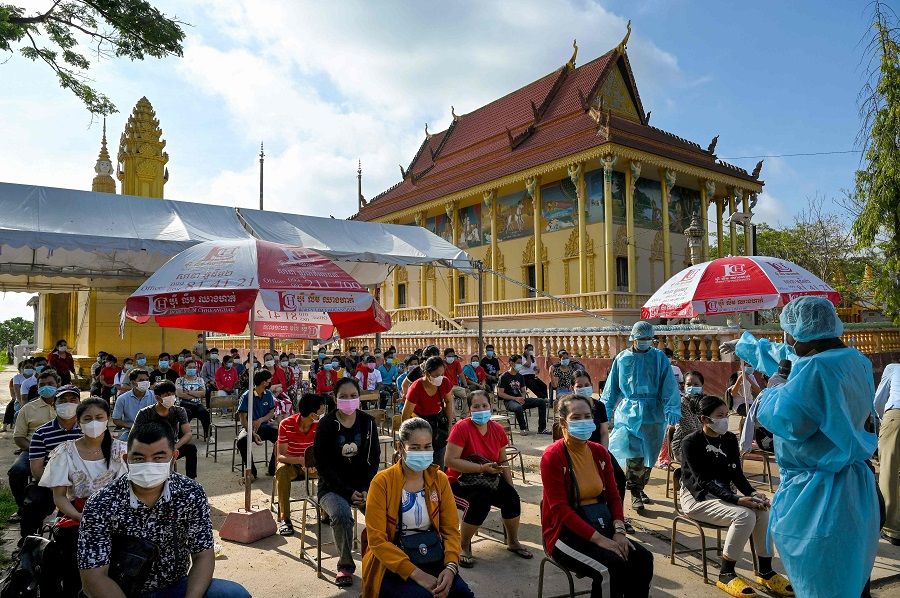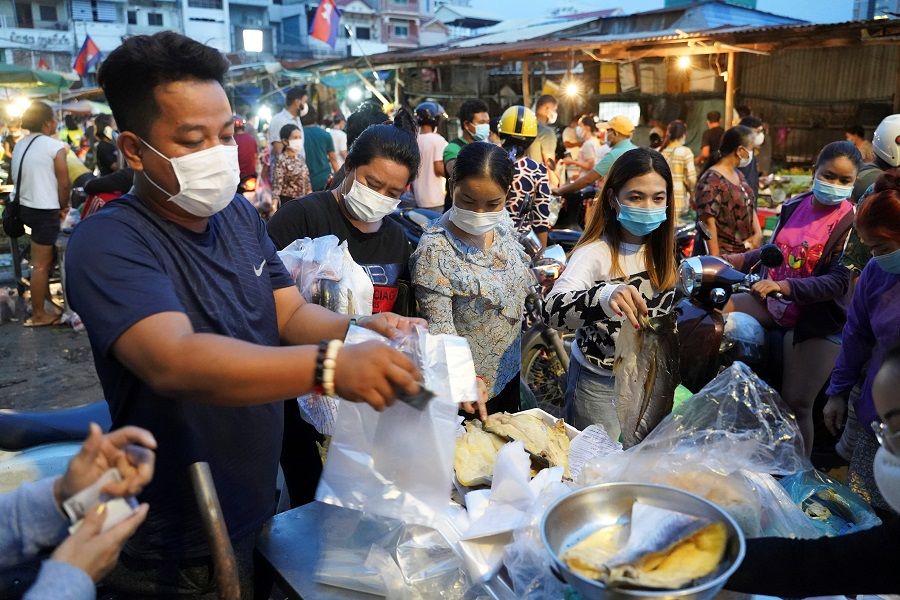Is Cambodia overly dependent on China?

Since the signing of the 1991 Paris Peace Agreements, Cambodia's foreign policy has centered on independence and neutrality. Cambodia would not take sides with any superpower as stated in one of the five principles in its foreign policy: "Protect national independence, sovereignty, territorial integrity and neutrality; maintain peace, security, stability, order and social unity." Despite this, in a recent speech, Prime Minister Hun Sen asked, "If I don't rely on China, who will I rely on?"
An over-reliance on China?
It is undeniably true that Cambodia's reliance on China has benefited Cambodia a lot in terms of economy, diplomacy and security. China is a key source of investment and assistance to Cambodia. According to an article on the Asia & The Pacific Policy Society website, around 43% of Cambodia's foreign direct investment in 2019 came from China. Furthermore, about 70% of infrastructure projects are financed by Chinese firms, providing jobs for Cambodia's workforce.
In security terms, China has provided confidence to Cambodia as a small state. China frequently provides military assistance to Cambodia. In 2019, China provided US$84 million to Cambodia as military assistance. Before the Covid-19 pandemic, China also conducted regular annual military exercises with Cambodia in order to strengthen the military ties between the two countries.
The trend of a marriage of convenience between Cambodia and China seems to suggest that Cambodia is overly dependent on China. Does this imply Cambodia is repeating its past tragedy?
An over-reliance on China could also put Cambodia at the forefront of China's rivalry with the US.

Cambodia's foreign policy over-reliance on China has presented many challenges for Cambodia. In recent years, Cambodia's international image has remarkably suffered as the country has been seen as a Chinese client state. A case in point was its action in 2012 and 2016 when Cambodia blocked ASEAN from issuing a resolution condemning the Chinese action in the South China Sea, which shows Chinese influence in Cambodia's foreign policy.
Getting embroiled in the China-US tussle and debt traps
An over-reliance on China could also put Cambodia at the forefront of China's rivalry with the US. The government in Phnom Penh has been viewed by Washington as leaning confidently toward China. The US has come up with a few policy options towards Cambodia including targeted sanctions on a few of Cambodia's top government officials and the delay of the renewal of the Generalised System of Preferences (GSP) trade preference programme for Cambodia. This could be a big loss for Cambodia as the US is Cambodia's largest market for the agricultural and garment sectors' products which amounted to US$6.5 billion in 2020, an increase of 22% from 2019. Growing tensions between the US and Cambodia could potentially threaten Cambodia's economy.
Currently, the accusation of Cambodia hosting a foreign military base could also potentially damage Cambodia's image in the international arena. Despite Cambodia allowing the US to visit its military base in Ream to show its sincerity, the US is still not satisfied as it demands full access to the Cambodian naval base. This could be the US using the pretext of a possible Chinese military base against Cambodia.
More fundamentally, Cambodia also risks being caught in the Chinese debt trap which can jeopardise Cambodia's sovereignty. The report released by Kiel Institute in 2019 found that Cambodia's debt to China is more than 25% of its gross domestic product. The debt keeps increasing as Cambodia continues to take loans from China. Cambodia's foreign debt increased to US$8.8 billion in 2020. Out of that amount, US$3.9 is owed to China which amounts to 40%. Cambodia could end up like Sri Lanka whose Hambantota port has been taken over by China.
The cycle of history
The current trend of Cambodia-China relations seems to suggest that it would be counterproductive if Cambodia continues to over-rely on China which is a rising challenger to the US. Cambodia experienced a lot of such things in the past.

In 1970, General Lon Nol staged a coup to overthrow King Norodom Sihanouk which led to the establishment of the Khmer Republic regime (1970-1975). Though there was controversy over the US involvement in the coup, it was believed that the changing of government in Cambodia had benefited the US greatly, especially, in terms of geopolitical interests.
It is worth noting that the Khmer Republic pursued a bandwagoning foreign strategy toward the US because its survival largely depended on US support. For instance, the US's military equipment and financial support to the Khmer Republic were approximately around US$1.8 billion and US$278 million in loans. This US loan to the Khmer Republic increased with interest to US$700 million, which has become Cambodia's debt to the US now. Moreover, Cambodia was the US's proxy against the Vietminh communists during the Cold War era. After losing in the Vietnam War, the US withdrew from Indochina which led to the rise of the Democratic Kampuchea in 1975, putting Cambodia into the hands of the Khmer Rouge, the darkest time ever in its history. Hence, Cambodia was of strategic importance to the US only in the containment of the Vietnam communists, not because Cambodia was special to the US.
Tragedy struck again when Cambodian communists who were largely sponsored and influenced by China took control over the kingdom in 1975. Around two million Cambodian people perished due to execution, hunger, and disease in three years and eight months. Despite full knowledge of the killing, China remained the backbone of the Democratic Kampuchea. Cambodia was strategically important for China to encircle Vietnam who was the Soviet's ally in Asia. China abandoned the Khmer Rouge in 1991 when its relations with Vietnam had been normalised.
Reflecting on these tragedies resulting from Cambodia's foreign policy, modern history should remind Cambodia's policymakers that if Cambodia continues to over-rely on any particular superpower, Cambodia would be choked by the latter's rivalry with others.
Although the current close relations between Cambodia and China benefit Cambodia a lot in terms of economy, security, and development, this could be counter-productive and put Cambodia in China's political clutches.
Lessons learned
There are three lessons that Cambodia should learn from its past experience. First, Cambodia should not over-depend on other countries, especially great powers. Although the current close relations between Cambodia and China benefit Cambodia a lot in terms of economy, security, and development, this could be counter-productive and put Cambodia in China's political clutches. The tragedy of the genocidal Khmer Rouge regime is an example of that. China seems to care only about its interests and influence in the international arena.

Second, Cambodia would be targeted and contained by its close friend's rivals. To put it bluntly, a friend of my enemy is my enemy. In this case, Cambodia could be easily used as a proxy by great powers when regional competition becomes more heated. Cambodia during the Sangkum Reastr Niyum fits this case well. The US believed that Cambodia supported North Vietnam when Cambodia cut diplomatic ties with it in 1965 and allowed the North Vietnam troops to hide and conduct guerrilla war from Cambodia's border. Consequently, the US dropped 2.7 million tons of bombs that are three times larger than the nuclear bomb the US dropped on Japan in 1945. The bomb devastated 30% of Cambodian territory and angered the Cambodia population who consequently joined the Khmer Rouge.
Finally, Cambodia's policymakers should learn that there are no such things as friends or enemies. There are only interests. Cambodia as a small state having any special relations with any great power of China or US either through hedging or bandwagon strategy is not a strange thing for maximising its national interests. However, in international politics, there is no "best friend" for a state to rely on forever, only interests can stay as a renowned British diplomat Sir Harold Nicholson aptly mentioned: "Nations do not have permanent friends or enemies. They have permanent interests." Similarly, as Hans Morgenthau put it, "International politics, like all politics, is a struggle for power."
Cambodia needs to avoid over-relying on any great power. It needs to opt for a flexible foreign policy and carefully balance its relations between the US and China.
This clearly indicates that a state is constantly in pursuit of its interests and power. A friend is a friend because they have common interests and friends can turn into foes any time when their interests change. Because interest is the crucial determinant of state policy, betrayal is expected and common in international relations. Any superpower would not mind putting small states in jeopardy when their interest is at stake. The period of 1970-1975 could be the best example to illustrate that conventional wisdom. The US did it in 1975 when it abandoned the Republic of Kampuchea, including top government officials such as Prince Sarik Matak to be executed by the Khmer Rouge. Washington may not hesitate to do it again if the same scenario happens.
Overall, what happened in history seems to suggest that whether Cambodia chose the US or China, it did not work well for Cambodia if it was overdependent on either one of them. Cambodia ended up the victim in the end. In this sense, Cambodia needs to avoid over-relying on any great power. It needs to opt for a flexible foreign policy and carefully balance its relations between the US and China. Failing to tread a tightrope between these two superpowers would present a great danger for Cambodia. History would repeat itself if Cambodia chooses to be overdependent on any single superpower.
